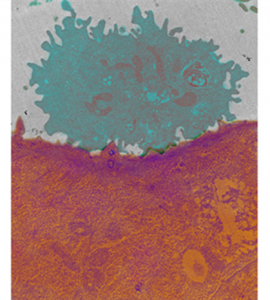Reduce, Reuse, Recycle – Repurposing Existing Medications
 I would consider myself to be environmentally friendly – I use a reusable coffee cup, avoid plastic straws and carpool to work. However, until recently, I had never contemplated applying these principles of “Reduce, Reuse, Recycle” to my work in the Breast Clinic.
I would consider myself to be environmentally friendly – I use a reusable coffee cup, avoid plastic straws and carpool to work. However, until recently, I had never contemplated applying these principles of “Reduce, Reuse, Recycle” to my work in the Breast Clinic.
Therapeutic monoclonal antibodies (mAbs) targeting specific antigens or receptors expressed on the surface of tumour cells have revolutionized cancer therapy. However, the clinical benefit is unfortunately limited to only a small portion of patients who do not display primary or acquired resistance. In a recent paper, Chew et al demonstrated how a drug found in most Emergency Department medication rooms, Prochlorperazine, could be repurposed to enhance the efficacy of monoclonal antibodies by increasing the cell-surface expression of tumour antigens.
We know that the efficacy of therapeutic mAbs capable of antibody dependent cell cytotoxicity (ADCC) is highly reliant on their ability to remain surface bound long enough for interaction between the mAb Fc region and immune effector cells, which ultimately leads to tumour clearance (2). In their paper, Chew et al utilized Dyngo4a (a dynamin inhibitor) to inhibit endocytosis and promote receptor clustering in squamous cell carcinoma cell lines. This was exceptionally successful in increasing EGFR-cetuximab binding and cetuximab-ADCC in both cetuximab-sensitive and cetuximab-resistant cell lines.
However, as Dyngo4a is not safe for human use, Chew et al, trialled the use of Prochlorperazine which is widely clinically available and currently utilized as both an antiemetic and antipsychotic. Prochlorperazine blocks dynamin-mediated EGFR internalisation and had excellent results in their in vivo models, successfully increasing the antitumor activity of cetuximab and avelumab in mouse models of cancer.
Human epidermal growth factor receptor 2 (HER2) is overexpressed in approximately 20% of breast cancers and is associated with an aggressive natural history and reduced overall survival (3). These patients are typically treated with Trastuzumab, a therapeutic humanized anti-HER2 mAb, in combination with chemotherapy, and has been successful in improving overall survival and slowing disease progression. However, a significant portion of patients do not respond to trastuzumab due to primary or acquired resistance (4).
Inhibition of HER2 internalization via the inhibition of ubiquination, dynamin inhibition or caveolin-1 depletion has demonstrated to increase the effectiveness of trastuzumab in HER2-positive breast cancer (5) and therefore increases the level of trastuzumab-mediated ADCC (1, 6). The application of prochlorperazine to this clinical context is an exciting future research direction and has the potential to remarkably alter the utilization of therapeutic mAbs in not only HER2-positive breast cancer but also a wide variety of other cancers previously deemed to have poor response rates to mAb therapy.
The research and development of novel pharmaceutical agents to improve our patients’ quality of life and overall survival is irrefutably necessary. However, much like bringing your breakfast to work in an old jar rather than a new plastic container, the innovative repurposing of existing medications in an unconventional clinical context should be celebrated.
This blog post was submitted by Emma Karlsen as part of our Summer 2020 blog contest. You can vote for your favorite on our Twitter, Facebook and LinkedIn. The winner will be announced on September 14, 2020.
References
Chew HY, De Lima PO, Cruz JLG, Banushi B, Echejoh G, Hu L, et al. Endocytosis inhibition in humans to improve responses to ADCC-mediating antibodies. Cell. 2020;180(5):895-914. e27.
Scott AM, Wolchok JD, Old LJ. Antibody therapy of cancer. Nat Rev Cancer. 2012;12(4):278-87.
Slamon DJ, Clark GM, Wong SG, Levin WJ, Ullrich A, McGuire WL. Human breast cancer: correlation of relapse and survival with amplification of the HER-2/neu oncogene. Science. 1987;235(4785):177-82.
Pohlmann PR, Mayer IA, Mernaugh R. Resistance to Trastuzumab in Breast Cancer. Clin Cancer Res. 2009;15(24):7479-91.
Pereira PMR, Sharma SK, Carter LM, Edwards KJ, Pourat J, Ragupathi A, et al. Caveolin-1 mediates cellular distribution of HER2 and affects trastuzumab binding and therapeutic efficacy. Nat Commun. 2018;9(1):5137.
Scaltriti M, Verma C, Guzman M, Jimenez J, Parra JL, Pedersen K, et al. Lapatinib, a HER2 tyrosine kinase inhibitor, induces stabilization and accumulation of HER2 and potentiates trastuzumab-dependent cell cytotoxicity. Oncogene. 2009;28(6):803-14.


